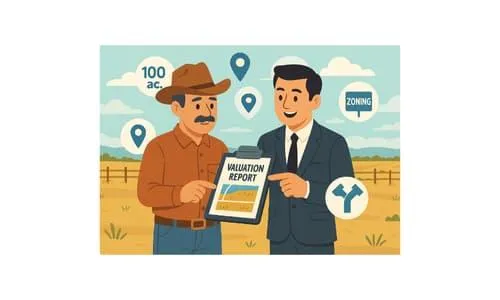
Understanding Land Value: What Your Texas Property Is Really Worth
"I Never Thought Selling My Land Could Be This Simple"
"I inherited land hundreds of miles away and had no idea how to handle it. Friendly Land Buyers made the process so easy and fast. They gave me a fair price, handled everything, and all I had to do was cash the check. It was such a relief!" – Amanda T.
For many Texas landowners, understanding the true value of their property can feel overwhelming. Whether you’ve inherited land, are looking to sell, or simply want to know what your property is worth, determining land value is a key step in making informed decisions. The process involves multiple factors, from location and zoning laws to natural resources and future market trends. Let’s explore what goes into determining land value in Texas and how you can confidently assess your property’s worth.
The Texas Land Market: A Unique Landscape
Texas is home to a vast and diverse landscape, ranging from the rolling hills of the Hill Country to the dry plains of West Texas. This variety makes the land market in Texas particularly unique. Unlike some states where land values remain relatively consistent, Texas has a dynamic market where values can shift significantly depending on location, size, and features.
A piece of land near a growing city like Austin or Dallas will have a much different value than one in a rural area with fewer development opportunities. The presence of water sources, road access, and zoning restrictions can also create wide variations in pricing. Understanding these factors is crucial for anyone looking to sell or evaluate their land’s worth.
A Historical Perspective on Texas Land Value
Land in Texas has always held value, but its worth has increased dramatically over time. In the early 1800s, settlers were able to purchase land for mere cents per acre. Stephen F. Austin, known as the "Father of Texas," sold land for just 12.5 cents per acre during the early settlement period. Fast forward to today, and some properties in prime locations can sell for tens of thousands of dollars per acre.
The appreciation of land values in Texas is largely driven by the state's rapid growth, economic expansion, and increasing demand for both residential and commercial development. Cities like Houston, San Antonio, and Austin have experienced tremendous population increases, further boosting demand for land and real estate. If you own land in Texas, you may be sitting on a valuable asset that has appreciated significantly over time.
What Determines Land Value in Texas?
Several key factors influence how much a piece of land is worth. While some aspects, like location, are fairly obvious, other considerations may not be as immediately apparent.
One of the most important factors in land valuation is location. Properties near major metropolitan areas, highways, or growing suburbs tend to have higher values due to development demand. Land close to Austin, Dallas, or Houston, for example, is often in high demand because of ongoing expansion and infrastructure projects.
The size and usability of the land also play a major role in determining value. Large parcels of land that are mostly flat and cleared are typically more valuable than land that is rocky, heavily wooded, or difficult to develop. If a property is suited for agricultural use, commercial development, or residential housing, it will generally be worth more than land with limited use potential.
Zoning laws and land use restrictions can significantly impact a property's worth. Land designated for commercial or residential development will often have a higher value than agricultural or recreational land. Some properties may have the potential to be rezoned, which could increase their value even further. Investors and developers frequently seek land that can be converted to a more profitable use.
Access to essential utilities and infrastructure also makes a property more desirable. Land with access to roads, electricity, water, and sewage services is usually more valuable than remote properties with no developed infrastructure. If a property has nearby utility connections or is within city expansion plans, it may become even more valuable over time.
Natural resources can play a significant role in a property's value. In Texas, landowners may have rights to valuable resources such as oil, gas, timber, or water. If a property includes mineral rights, it could be worth far more than land without these assets. Investors and energy companies often seek land with resource potential, and owners may have opportunities to lease or sell their mineral rights.
How Professionals Assess Land Value
There are multiple ways professionals determine land value, and the approach can vary depending on the type of property being evaluated.
The sales comparison approach is one of the most common valuation methods. It involves comparing the property to similar parcels that have recently sold in the area. Adjustments are made for differences in size, location, and features to estimate the market value accurately.
For income-generating properties, such as farmland or land with mineral leases, the income approach is often used. This method calculates the property's value based on its ability to generate income over time. For example, if a piece of land produces a steady stream of revenue from agricultural activities or oil and gas leases, that income potential increases the land’s overall value.
Another method used is the cost approach, which estimates the current cost of purchasing the land and making necessary improvements while accounting for depreciation. This approach is often used for properties where improvements, such as buildings or infrastructure, contribute significantly to the overall value.
Steps You Can Take to Determine Your Property’s Worth
If you’re curious about how much your Texas land is worth, there are a few steps you can take to get a clearer picture.
Start by researching comparable land sales in your area. Online listings, county records, and real estate websites can provide insight into recent transactions involving similar properties. This can give you a ballpark estimate of what buyers are willing to pay.
Consulting local experts is another valuable step. Real estate agents, appraisers, and land specialists familiar with your region can provide insights into current market trends and potential buyers. Their expertise can help you better understand what factors might be driving land values in your area.
For an accurate valuation, consider getting a professional appraisal. A licensed appraiser will conduct a thorough analysis of your property, taking into account its size, location, zoning, and features. An official appraisal can be particularly useful if you’re looking to sell or need documentation for legal or financial purposes.
Additionally, keep an eye on zoning laws and upcoming infrastructure projects. Changes in zoning regulations or new road developments can significantly impact a property’s future value. If your land is in an area targeted for expansion, its worth may increase in the coming years.
Assess any natural resources that might add value to your property. If you own mineral rights, water rights, or timber, these factors could contribute to a higher valuation.
Need Help?
Selling inherited land can feel overwhelming, especially when dealing with out-of-state properties or unresolved tax issues. We’re here to make the process as simple and stress-free as possible.
Call us directly at 888-912-3242 for immediate assistance.
Text us at 888-912-3242 for a quick response.
Click the chat icon in the bottom right corner to start a conversation now.
Our experienced land specialists understand inheritance situations and are happy to explain your options without any pressure. Take the first step toward peace of mind today.
Remember: There’s no rush to decide. Take your time, explore your options, and choose the solution that’s best for you and your family.
Disclaimer: This guide provides general information and should not be considered legal advice. Please consult with a qualified attorney for specific guidance on your situation.

